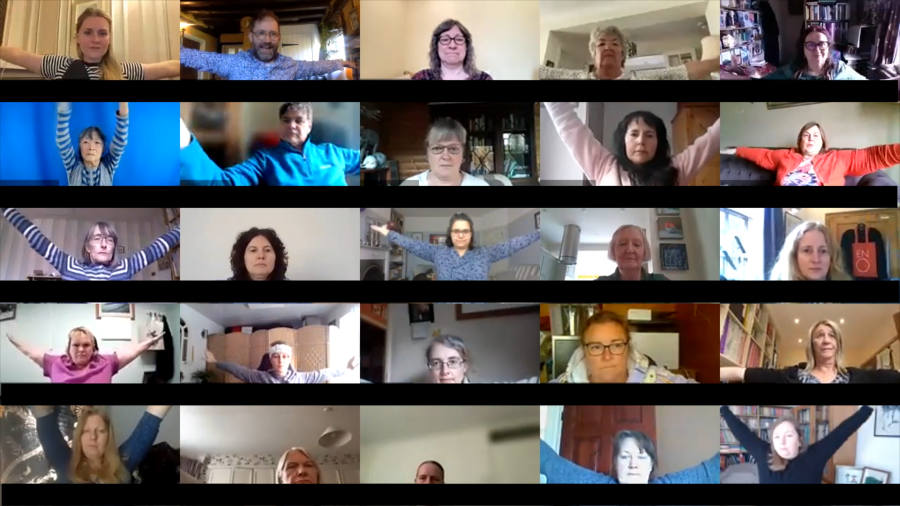Singing is helping these ‘long COVID’ patients feel better
Testing on staging11
(NewsNation) — After an early bout with COVID-19 and lingering symptoms, London resident Sharon Sullivan found herself seeking relief in a surprising setting: singing with the English National Opera.
In the spring of 2020, Sullivan contracted COVID-19. As the year went on, some of her symptoms persisted and her doctor began to talk to her about what came to be known as “long COVID.” It’s a condition the American Medical Association defines as a “wide range of new, returning or ongoing health problems people may experience more than four weeks after being first infected.”
In Sullivan’s case, she continued to experience fatigue, breathlessness, and neurological symptoms that included tingling and numbness in her arms and legs.
Medical professionals referred Sullivan to the English National Opera’s (ENO) Breathe program, which consists of online group classes that teach around 20 participants at a time singing and breathing exercises to help them manage their long COVID symptoms.
“The idea that I could join something that gave me a little bit of control and kind of real ownership of my recovery really seemed attractive,” Sullivan said.
The program was developed through a partnership between the ENO and doctors at Imperial College Healthcare National Health Service Trust.
“What came through quite consistently in the feedback we were getting from doctors was this kind of consistent picture about long COVID and not having options or pathways to refer patients on to,” said Jenny Mollica, the director of ENO Engage.
The ENO Breathe program was designed to provide those options. Each session is led by an ENO professional singer who starts by encouraging participants to become aware of their breathing and muscles related to that breathing like those in the side of the neck and top of the back. They then walk participants through various breathing techniques and exercises designed to help them breathe easier.
In each session, participants are encouraged to sing.

“Your voice is a wind instrument … by looking at voicing together with breathing we can find some ways to promote good vocal health generally,” said Suzi Zumpe, singing specialist and creative director of ENO Breathe.
Evidence of ENO Breathe’s effectiveness is more than anecdotal. A study published in The Lancet Respiratory Medicine found that in conjunction with standard treatment, participants experienced a reduction in breathlessness during running and an improvement in their mental health.
“We urgently need evidence-based treatments and interventions for people with long COVID, which currently affects approximately 1 in 50 people in the UK,” said Dr. Keir Phillip, the lead author of the study, in a news release accompanying the research. “Our study suggests that arts-in-health interventions can be effective tools for carefully selected participants, especially when successfully integrated with clinical services.”
The program’s exercises and singing are particularly focused on extending exhalation because when people get anxious about their breathing, they tend to focus on inhalation.
It was admittedly awkward for Sullivan at first.
“I was terrified of the singing,” Sullivan said. “Even though I’d sung when I was in school as a teenager. I just thought, no, no it’s going to be so embarrassing. But actually, you see we can’t hear each other most of the time but you see just in people’s faces that they are so enjoying it. … It’s liberating.”
The team at ENO Breathe assured Sullivan that they wouldn’t ask her to do anything she didn’t want to do. She decided to give it a try, and the experience taught her techniques she can use to manage her condition and control her breathing while walking or getting ready for bed.
ENO Breathe’s music of choice is lullabies.
“That’s important because the purpose of a lullaby is to soothe, to calm down, to slow down,” Zumpe said. “They offer the promise of morning, which if people are feeling quite dark and lonely is important. But also culturally, they are appropriate to all of us. All of us, wherever we’re from in the world, know what a lullaby is and what it’s for.”
Mollica emphasized that the program isn’t for everyone. Access to ENO Breathe is only granted through a strict referral process that must be conducted by medical staff. The program focuses on specific long COVID symptoms such as breathlessness and anxiety.
“We wouldn’t necessarily be taking patients with abnormal imaging on their lungs,” Mollica said, offering one example.
The program is designed to welcome a broad array of clients, however. ENO Breathe does a one-on-one meeting with every participant designed to generate trust. And clients have the option to silence their microphones when they sing.
“I think that notion of being able to be on mute when you sing, if you’re not very confident as a singer, probably means that the program is accessed by people who might not necessarily quite have the confidence to physically come to a place and take part,” Mollica said. “And there’s something about that, being in your own home environment really improves the accessibility of the program.”
